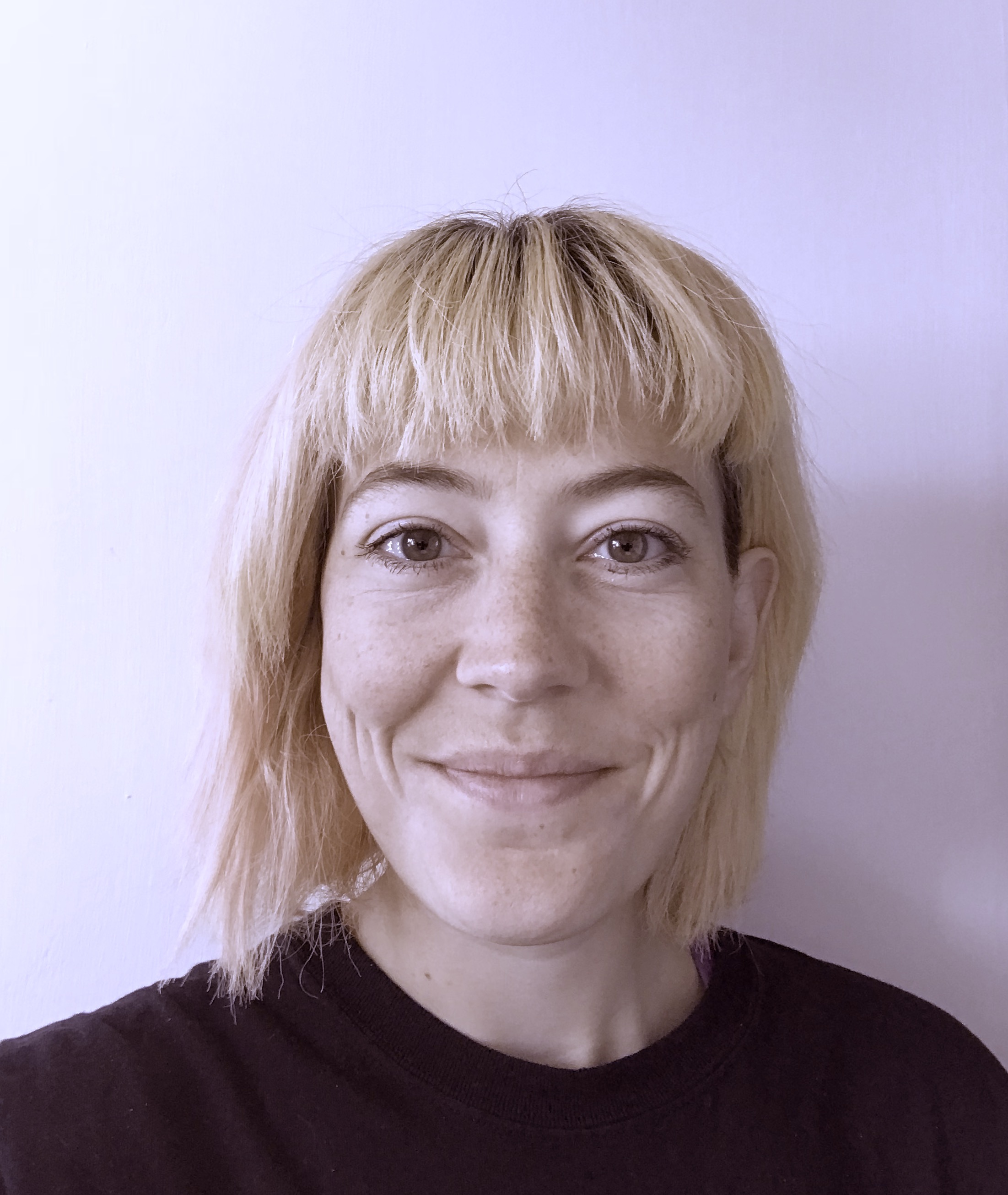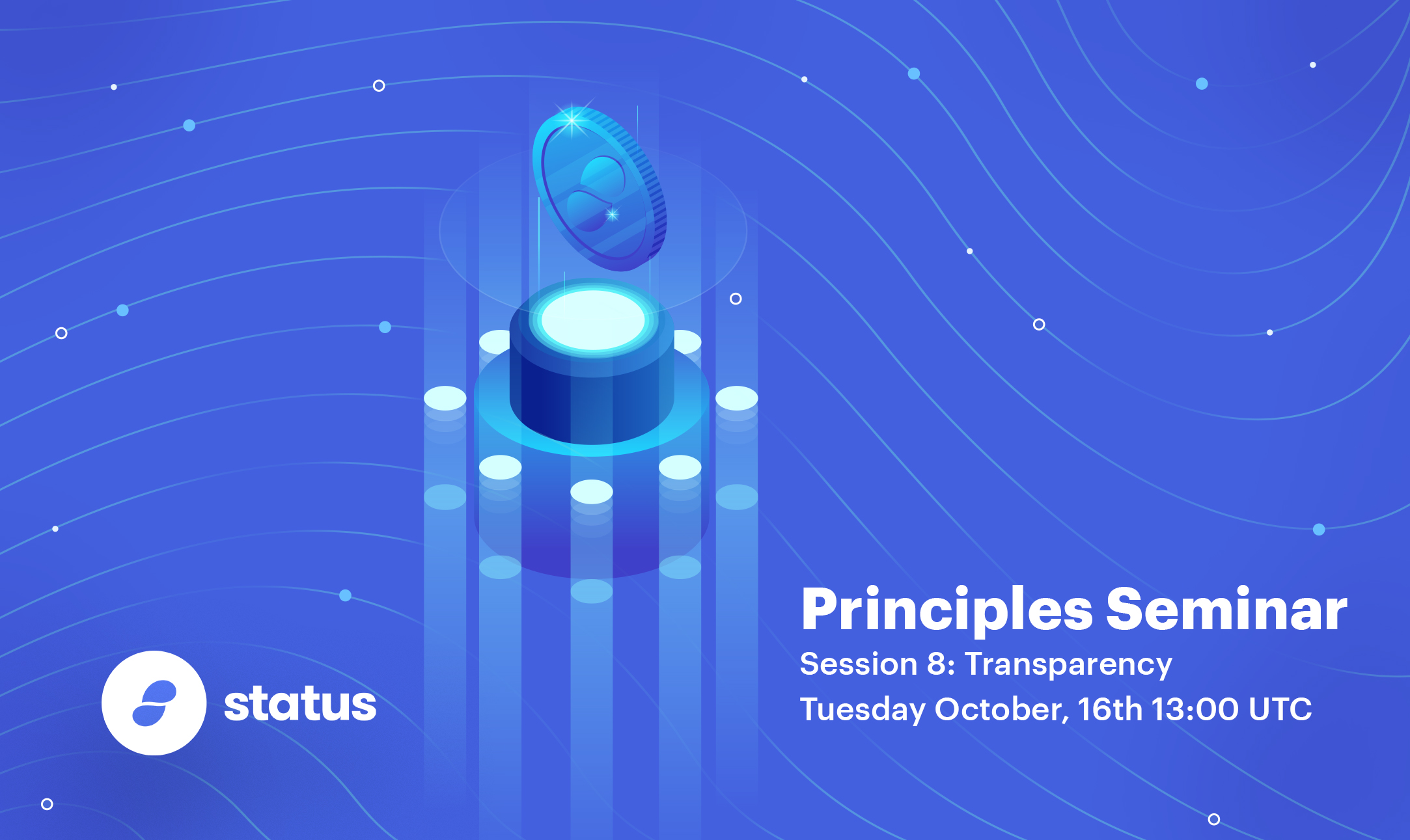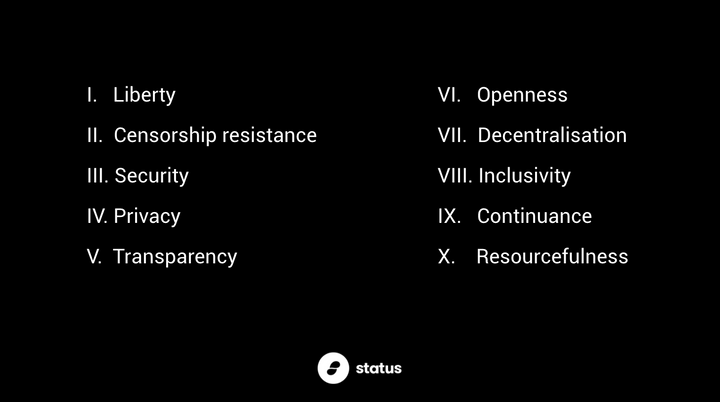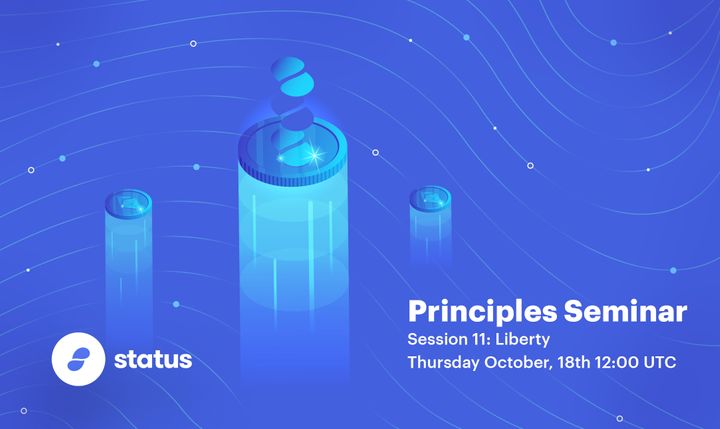In the eighth session of this 12 part series, join status' core contributors as we discuss and debate to which degree we uphold our principles, how we can improve our performance, and what we're adding to our Wall of Shame.
Transparency:
We strive for complete openness and symmetry of information within the organization, and have no border between our core contributors and our community. We are frank about our shortcomings, especially when making short-term tradeoffs in service of our long-term goals.
Slide Deck:
Seminar Opening presentation
Seminar Index
Transparency Session Notes (reprinted below)
Youtube:
Wall of shame
- JB: user focus/POV, not clear how transparent we are, how we track and what we track, opening up app not clear enough
- Iuri: on Embark itself do a lot of things internally, not too happy about it. More open about processes etc. Ex: We use pivot tracker, private, discuss things privately, etc, use more public bug tracker/public channels instead. Also ongoing discussion vs privacy. Know context for PR/bug fix as non CC.
- Shawn: marketing POV, how incorporate community into decision making, community not involved in decision? barriers in place right now
- Ceri: what % of meetings result in artifacts, also info overload, rationale behind decisions
- exiledsurfer: No Financial Disclosure Policy / statement, salary etc, data choosing not to be transparent about say what data it is and give reason for it
- Dani: for finance transition period to DAO unclear, salary delicate issue, once DAO public, to open up don't see roadmap, payment details delicate for DAO as well. E.g health issues via state, should prob be private, covered via separate channel? etc
- Ben: for incubate, need path/roadmap for how to implement transparent process, community involvement etc, not clear what full transparency means in this context
- Corey: if we hold ourselves to other companies we are ridic transparent, own standard not sure what transparency exactly means, what specifically striving for outside of giving to all
- Rajanie: think insanely transparent, give more credit, being too hard on ourselves, decisions being made, hard to see where ideas come from too much info
- rramos: dev meetings make decisions, public publish channel, share knowledge not kept to few people
- Oskar: as non CC not clear what starting point is, where to make an impact, see recent state of things
- Oskar: we lack canonical guarantees, darkness we don't have disclaimers, docs
- Oskar: inbetween dao/central company model, principal-agent what Status mukltisig paying for exactly vs tenure
- Oskar: lack of ARD haphazardly decisions dev
- exiledsurfer: nightly release made it through but we don't have processes for QA/secure, we don't have easily discoverable documentation.
- Oskar: async-consumable meeting notes
- Ricardo: (transparency, openness) information, whys and hows
- Ceri: Wondering also if we’ve defined transparency in terms of how it helps us achieve our goals, and why it’s beneficial?
- Graeme: YT/docs/GH good, not entirely clear how to get involved, data/places to look, where participate
NOTES
[Michael]
I've been encouraging other teams to record calls, post notes. Since we're moving off slack, there's a lot less chattiness. How do you feel about expanding this form of communication out. Record calls and post out in discuss. We could stay more informed about each other.
[Ricardo]
Time-expensive for people to watch all the calls.
[Akshi]
Could we accomplish that goal by sharing a one-page summary out instead of recording?
[Michael]
That would be a step in the right direction. That would achieve more than we have at the moment.
[Ben]
Seems like overkill - not useful transparency. We could consider having a weekly review or write-up to communicate out.
[Corey]
Tags could really help using notes.status.im
[Oskar]
Do people agree with the definition of transparency.
[Ben]
But hard to reconcile transparency for the sake of it versus transparnecy for real need.
[Akshi]
Transparency versus competitive advantage.
[Iuri]
Some times we have thoughts not complete, and it's good to work through them before sharing.
[Michael]
Why do we want to be transparent? For Token Holders, Community Members, Core Contributors.
[Akshi]
Start with the goal. There could be 5 different ways to achieve it.
[Shawn]
By providing too much transparency, could it get overwhelming for the community member/token holder.
[Akshi]
Do people need to know every step in the process? If all info is out there, it's open to very borad interpretation.
[Oskar]
How do you know what information is useful? If we want people to contirbute to our work, they need to be aware of the information not just the solution.
[Akshi]
What and why are important before outlining the decisions. If we define that, it could be clear what information we should share.
[Corey]
I don't know how Status makes money, or the runway we have. I don't understand the financial future of the company.
[Michael]
There will be a lot of stuff happening in Prague. Where are the gaps in our efforts (re: slide 7).
[Ricardo]
Great usecase for transparency. We need a new platform to share information.
[Akshi]
Being more transparent interally with financial information. There is an anonymous question opportunity. The entire townhall was uncensored. Got questions on culture, finances, hiring - allow CCs to ask unfiltered questions.
[Oskar]
Right now, we're paid by a one or two entities, have the same email platform. Maybe we should be more decentralized and more segmented. We all have Google Docs - so we don't think twice about using permissioned systems to create docs. It's a different starting point.
[Michael]
We are legacy companies aspiring towards a DAO.
[Ben]
This will be a slow movement. Gradual steps to becoming a DAO. Can't suddenly wake up and decide to become a DAO.
[Ricardo]
Privacy concerns around a DAO.
ACTION ITEM:
- PeopleOps to revert re: Financial Transparency (how much, and why). Include Corey & Ben.









